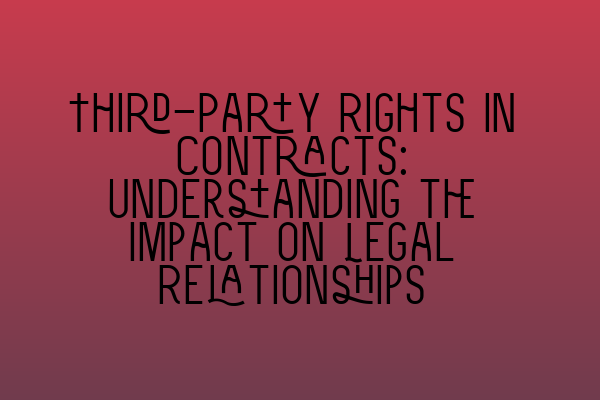Third-Party Rights in Contracts: Understanding the Impact on Legal Relationships
Contracts are an essential part of conducting business and establishing legally binding relationships. However, it is not uncommon for contracts to involve more than just the two parties directly involved. In certain situations, third parties may have rights or obligations under the terms of a contract. Understanding the impact of third-party rights in contracts is crucial for all parties involved.
In this blog post, we will explore the concept of third-party rights in contracts, how they can affect legal relationships, and why it is important to carefully consider them when drafting or entering into a contract.
What Are Third-Party Rights in Contracts?
Third-party rights in contracts refer to the rights or obligations that are granted to or imposed upon individuals or entities that are not signatories to the contract. In simpler terms, it means that someone who is not a party to the contract can benefit from or be bound by the terms of the contract.
There are two types of third-party rights in contracts: third-party beneficiaries and third-party assignees.
Third-Party Beneficiaries
A third-party beneficiary is an individual or entity that has the right to enforce and benefit from the contract, even though they are not a party to it. This means that if the contract is breached, the third-party beneficiary has the legal standing to take legal action against the breaching party and seek remedies.
For example, let’s say Company A enters into a contract with Company B to provide a service. The contract includes a clause stating that Company C, a customer of Company B, will benefit from the service. In this case, Company C is a third-party beneficiary and has the right to enforce the terms of the contract and seek damages if Company B fails to provide the service as agreed upon.
Third-Party Assignees
On the other hand, a third-party assignee is someone who receives the rights or obligations of one of the original parties to the contract. This means that one party assigns its rights or obligations to a third party, effectively transferring its position under the contract.
For instance, let’s consider a scenario where Person A contracts with Person B to sell a piece of property. If Person A assigns the right to purchase the property to Person C, Person C becomes a third-party assignee and assumes Person A’s rights and obligations under the contract. Person C can then proceed with the purchase and enforce the terms of the agreement.
Why Are Third-Party Rights Important?
Understanding and considering third-party rights in contracts is crucial for several reasons.
Firstly, it ensures clarity and certainty in legal relationships. By explicitly identifying and including third-party rights in the contract, all parties involved are aware of their rights and obligations. This can help prevent future disputes and provide a firm foundation for the legal relationship.
Secondly, acknowledging third-party rights can enhance business relationships and facilitate smooth transactions. By allowing for the inclusion of third parties, businesses can benefit from collaborations, subcontracting, and other arrangements that can help achieve their goals more effectively.
Thirdly, recognizing third-party rights can protect the interests of those who would otherwise have limited recourse. It provides a legal avenue for third parties to seek remedies and enforce the terms of the contract. This is particularly important in situations where the third party may not have been able to negotiate the terms of the contract directly but still has a substantial interest in its performance.
Tips for Considering Third-Party Rights in Contracts
When drafting or entering into a contract that involves potential third-party rights, there are a few key considerations to keep in mind:
1. Clearly identify the parties: Clearly define the parties involved in the contract, including any potential third-party beneficiaries or assignees. This ensures that everyone understands their rights and obligations under the contract.
2. Specify the rights and obligations of third parties: Clearly state the rights and obligations of any third parties involved in the contract. This will help avoid any ambiguity or misunderstandings.
3. Obtain consent: If a contract is intended to confer rights on a third party, it is crucial to obtain the consent of that third party. This ensures that they are fully aware of their rights and are willing to be bound by the terms of the contract.
4. Review existing contracts: When assigning rights or obligations to a third party, it is important to review any existing contracts to ensure that such assignments are allowed and do not violate any terms.
Conclusion
Third-party rights in contracts play a significant role in shaping legal relationships. Understanding the impact of these rights and considering them when drafting or entering into a contract is essential for all parties involved. By carefully considering and addressing third-party rights, businesses can ensure clarity, protect their interests, and foster successful collaborations.
If you want to deepen your understanding of contract law and prepare for the SQE exams, make sure to check out these related articles: [SQE 1 Practice Exam Questions], [SQE 1 Practice Mocks FLK1 FLK2], [SQE 2 Preparation Courses], [SQE 1 Preparation Courses], and [SRA SQE Exam Dates]. These resources will provide you with valuable insights and help you excel in your legal studies.
Remember, a well-drafted contract takes into account all potential third-party rights and obligations, ensuring a strong legal foundation for successful business transactions and collaborations.
